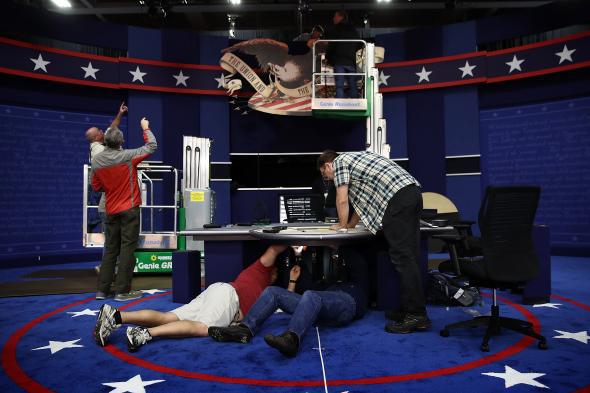Indiana Gov. Mike Pence and Virginia Sen. Tim Kaine get their turn to face off in primetime on Tuesday during the first and only vice presidential debate of 2016. A record 84 million people tuned in to watch the top of their tickets, Donald Trump and Hillary Clinton, square off last week. But nobody expects there to be the same level of interest in a debate between two men whose biggest selling points during the veepstakes included their wallpaper-like ability to blend into the background.
The question, then, is how much will the VP debate actually matter: not a lot or not at all?
That’s not to dismiss Tuesday’s debate as unimportant in the grand scheme of things. One of the two men on stage will have a major role in the next administration and be a proverbial heartbeat away from the presidency in an administration of one of the oldest first-term presidents in history. The American public could gain valuable insights from seeing both men try to think on their feet, particularly given Trump has previously signaled that he may rewrite the job description of his veep to include much of the day-to-day running of the country. But past research has shown that there’s just no reason to believe what happens on stage in Virginia on Tuesday will significantly impact what happens in the voting booth come November. Heck, there’s little evidence to suggest that even a presidential debate can prove decisive in determining who becomes president.
In 2012, for example, Mitt Romney was widely considered to have trounced President Obama in the first head-to-head contest. But while Romney saw one of the largest post-debate polling bumps in modern history—roughly four points—Obama would eventually rebound and go on to win the election by roughly the same margin he had led in the pre-debate surveys. Signs point to similar short-term gains for Clinton after Trump unraveled on stage last week, but: a) we’re still waiting for that bump to fully materialize and b) even if it does, it will be impossible to separate what happened on stage from what happened in its aftermath and what happened prior. Furthermore, political scientists have previously taken a close look at those alleged game-changers from debates past—Richard Nixon’s sweating; Al Gore’s sighing—and didn’t find evidence that they mattered all that much. Given the increasingly polarized nature of the American electorate—along with voters’ strong views about both Trump and Clinton—it stands to reason that holds true today.
Vice presidential debates have been even less consequential affairs. John McCain’s selection of Sarah Palin as his running mate may have sealed his November fate, but her debate with Joe Biden—the only VP debate in the past 40 years to have a larger TV audience than a presidential debate the same year—may best be remembered for the relatively benign moment when she asked her opponent, “Hey, can I call you Joe?” Walter Mondale branding Bob Dole a “hatchet man” in 1976 or Lloyd Bentsen telling Dan Quayle that he was “no Jack Kennedy” in 1988 also made for memorable TV moments—but they also didn’t change many minds.* In 2012, Gallup analyzed voter preferences before and after the eight VP debates held between 1976 and 2008 (there was no VP debate in 1980) and found the undercards “had almost no influence.” Scholars say the same thing. In his 1996 book Do Campaigns Matter?, for instance, University of Wisconsin-Milwaukee professor Thomas Holbrook concluded “there is very little evidence that vice presidential debates do much at all to alter the political landscape.”
Voters appear to grasp this reality as well, at least implicitly. A recent ABC news poll, for example, found only 1 in 10 Americans said they thought Tuesday’s clash would have a major impact on their vote—less than half the 23 percent who said the same thing about the first presidential debate. The best case for why this VP debate will matter, meanwhile, is intrinsically wrapped up in an even more compelling reason to suspect it won’t: Asked by the ABC pollsters to identify Trump and Clinton’s running mates, 41 percent failed to name Pence and 46 percent failed to name Kaine. For many voters, then, Tuesday’s debate will be the first time they’ve paid significant attention to either on the campaign trail. But if history is any guide, it may also likely be the last time they do before Election Day.
Read more Slate coverage of the 2016 campaign.
*Correction, Oct. 3, 2015: This post originally mispelled Dan Quayle’s last name.
